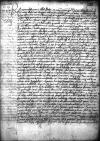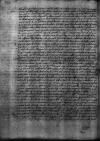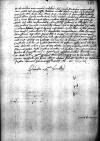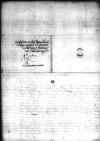Cum mihi datum est longius ad scribendum tempus, non potui mihi temperare, quin de rebus meis uberius ad Dominationem Vestram Reverendissimam scriberem. Quam humiliter et summopere rogo pro sua in me gratia, non aegre neque aliorsum atque ego sentio id, quod a me scribitur, ferat. Urget me conscientia, urget me fides, necessitas me cogit, quod semper in meis litteris multis querelis sim morosior. Quid calamitosius quam dum illi, qui affligitur, non lacrimae solum, verumetiam singultus et gemitus prohibentur.
cf. Cic. Phil. 12, 19 Parcite oculis saltem meis et aliquam veniam iusto dolori date. ⌊Dabit itaque Dominatio Vestra Reverendissima pro sua in omnes benignitate iusto dolori meo veniamcf. Cic. Phil. 12, 19 Parcite oculis saltem meis et aliquam veniam iusto dolori date. ⌋. Ex litteris meis iis annexis Dominatio Vestra Reverendissima, quomodo huc venerim et quantum de viatico attulerim, intellexit. Sum nunc ⌊hic⌋, ago magni ⌊regis⌋ oratorem, aspicior, quod a tam longinquis partibus venerim, ab omnibus. Adeunt me duces, comites, barones et plerique de primis aulicis, laudor interdum, aegre fertur, quod officiales curiae non accuratiorem habuissent in primo adventu mei rationem, habeor in ea, qua decet ad honorem ⌊serenissimi domini mei⌋, dignitate atque aestimatione. Ego spem vultu simulo, cf. Verg. A. 1. 208-209 Talia voce refert curisque ingentibus aeger / spem vultu simulat, premit altum corde dolorem. ⌊premo maesto in corde doloremcf. Verg. A. 1. 208-209 Talia voce refert curisque ingentibus aeger / spem vultu simulat, premit altum corde dolorem. ⌋, omnibus me talem, ut consuetum est ab aliis oratoribus, exhibeo. Qualis sub hac persona videri debeo, nihil a me praetermittitur, quemadmodum alii oratores faciunt, quod ad ornamentum et faciendam aestimationem in iis exteris regionibus ⌊serenissimo domino meo⌋ dignum et conueniens videtur. Cum autem loculos meos contemplor et post tergum, quantum intercapedinis mihi pro reditu restat, prospicio spemque dubiam de ulteriori provisione ⌊maiestatis regiae⌋ ante oculos pono. Quis mihi sit animus, quae mens, quales me subeant cogitationes, non ⌊victor⌋ ille ⌊Sphingos ms. Spingos(!)
⌈SphingosSphingos ms. Spingos(!)
⌉⌋, sed quivis morio manifestam potest facere coniecturam.
Accepi in mutuum trecentos ducatos, 60 mecum attuli, agitur hodie 18 dies. Quod ⌊huc⌋ veni Dominationi Vestrae Reverendissimae sic ut Deo sum solitus, ingenue omnia confitebor cum ista, quam emi, mula usque ad hunc 1523-01-06⌊Sanctorum Trium Regum diem1523-01-06⌋ exposui hic satis frugaliter vivens 92 ducatos. Omnia utensilia domus et quae ad culinam spectant, emi. Hic nihil, nisi quod quisque secum fert, habetur; etsi habetur, non datur frustra. Lectum, in quo ego et in quibus servi dormiunt, satis magno pretio conduxi, interpretem et cocum in menstruo stipendio habeo, unum item, qui coquinae et aliis rebus domesticis inservit, propter Deum ut victum habeat, teneo, tres famulos et puerum mecum ex domo adduxi. Haec est mearum rerum summa. Si ⌊caesar⌋ iste diutius me hic detinebit (de muneribus nihil spero, nam nuda hic paupertas est), quomodo redibo? Etiam si hodie abirem et in ⌊Coronia⌋ navem ascenderem, quae me ad ⌊Angliam⌋ ferret, quomodo ad ⌊ducem Georgium Saxoniae⌋ his pecuniis peruenire possim? Adderem plura, sed haec pauca fortassis nimium dura et molesta videbuntur. Nollem enim, etiam si mihi omnia extrema forent perferenda, in minimo animum Dominationis Vestrae Reverendissimae erga me offendere. Quare eandem omni, quo possum, conatu et si patitur per Deum immortalem humiliter rogo atque obsecro, dignetur me ea gratia, qua me huc duxit, reducere  BNW, BOZ, 2053, TG 4, No. 389, f. 126v et mihi intercessione sua apud ⌊maiestatem regiam⌋ subuenire, ut sine meo magno damno et sine on the margin⌈sinesine on the margin⌉ illius maiestatis, ut ita dicam, dedecore redire valeam. Antequam istae praeferentur ad Dominationem Vestram Reverendissimam, spero me futurum in reditu, si itaque maiestas regia dignabitur mihi aliquid ad hoc, quod nunc mihi est, pecuniarum addere, ut illud apud ⌊Fuggaros⌋ ⌊Antverpiae⌋ liceat invenire, ea, quae ad hoc servitium ⌊maiestatis regiae⌋ et ad hanc profectionem de meo stipendio impendi, etiam ea, quae pro sex meis equis venditis accepi, quae omnia faciunt magis quam trecentos florenos nostros, cf. Cic. Att. 13, 50, 3 De adventu Caesaris idem quod a te mihi scriptum est ab Oppio et Balbo. miror te nihildum cum Tigellio; velut hoc ipsum, quantum acceperit, prorsus aveo scire, nec tamen flocci facio.; Pl. Cur. 713; Pl. Epid. 348; Pl. Men. 432; Pl. Trin. 918, 992; Pl. Truc. 606 ⌊flocci faciocf. Cic. Att. 13, 50, 3 De adventu Caesaris idem quod a te mihi scriptum est ab Oppio et Balbo. miror te nihildum cum Tigellio; velut hoc ipsum, quantum acceperit, prorsus aveo scire, nec tamen flocci facio.; Pl. Cur. 713; Pl. Epid. 348; Pl. Men. 432; Pl. Trin. 918, 992; Pl. Truc. 606 ⌋ et minime curo, modo cum honestate in primis ⌊serenissimi domini mei⌋ et mea redire possim. Quod Dominatio Vestra Reverendissima auctoritate sua, qua plurimum apud ⌊maiestatem regiam⌋ potest, meritis etiam meis id aliquantulum exigentibus et pro sua singulari in me gratia commode poterit efficere. Cum feliciter, ut in meum Creatorem spero, rediero, de omnibus mihi datis luculentam redditurus sum rationem. Et si huic non posse satis facere, deprehendar, si bona mea, quae pauca sunt, non correspondebunt, plectar in corpore, immo sine omni misericordia moriar neque vivere velim, si tali obnox<i>us flagitio, seu potius perfidia, quam per omnem vitam meam fugi, maxime invenirer. Sed iam satis his meis cotidianis querelis Dominationem Vestram Reverendissimam obtudi. Deinceps, cum scripsero, nullas meae litterae amplius ferent. Parcat itaque iusto dolori, hactenusque dolentis gemitus et lamenta pietate mota Dominatio Vestra Reverendissima benigniter suscipiat.
BNW, BOZ, 2053, TG 4, No. 389, f. 126v et mihi intercessione sua apud ⌊maiestatem regiam⌋ subuenire, ut sine meo magno damno et sine on the margin⌈sinesine on the margin⌉ illius maiestatis, ut ita dicam, dedecore redire valeam. Antequam istae praeferentur ad Dominationem Vestram Reverendissimam, spero me futurum in reditu, si itaque maiestas regia dignabitur mihi aliquid ad hoc, quod nunc mihi est, pecuniarum addere, ut illud apud ⌊Fuggaros⌋ ⌊Antverpiae⌋ liceat invenire, ea, quae ad hoc servitium ⌊maiestatis regiae⌋ et ad hanc profectionem de meo stipendio impendi, etiam ea, quae pro sex meis equis venditis accepi, quae omnia faciunt magis quam trecentos florenos nostros, cf. Cic. Att. 13, 50, 3 De adventu Caesaris idem quod a te mihi scriptum est ab Oppio et Balbo. miror te nihildum cum Tigellio; velut hoc ipsum, quantum acceperit, prorsus aveo scire, nec tamen flocci facio.; Pl. Cur. 713; Pl. Epid. 348; Pl. Men. 432; Pl. Trin. 918, 992; Pl. Truc. 606 ⌊flocci faciocf. Cic. Att. 13, 50, 3 De adventu Caesaris idem quod a te mihi scriptum est ab Oppio et Balbo. miror te nihildum cum Tigellio; velut hoc ipsum, quantum acceperit, prorsus aveo scire, nec tamen flocci facio.; Pl. Cur. 713; Pl. Epid. 348; Pl. Men. 432; Pl. Trin. 918, 992; Pl. Truc. 606 ⌋ et minime curo, modo cum honestate in primis ⌊serenissimi domini mei⌋ et mea redire possim. Quod Dominatio Vestra Reverendissima auctoritate sua, qua plurimum apud ⌊maiestatem regiam⌋ potest, meritis etiam meis id aliquantulum exigentibus et pro sua singulari in me gratia commode poterit efficere. Cum feliciter, ut in meum Creatorem spero, rediero, de omnibus mihi datis luculentam redditurus sum rationem. Et si huic non posse satis facere, deprehendar, si bona mea, quae pauca sunt, non correspondebunt, plectar in corpore, immo sine omni misericordia moriar neque vivere velim, si tali obnox<i>us flagitio, seu potius perfidia, quam per omnem vitam meam fugi, maxime invenirer. Sed iam satis his meis cotidianis querelis Dominationem Vestram Reverendissimam obtudi. Deinceps, cum scripsero, nullas meae litterae amplius ferent. Parcat itaque iusto dolori, hactenusque dolentis gemitus et lamenta pietate mota Dominatio Vestra Reverendissima benigniter suscipiat.
Mitto Dominationi Vestrae Reverendissimae ⌊⌋ inclusos, quos ⌊magno cancellario⌋ ⌊caesari⌋ legendos reddi commiseram, ut cognoscat Dominatio Vestra Reverendissima, quod neque ⌊Helicona⌋ intactum reliqui, quo minus res mihi commissae agerentur, habuique eo die audientiam cf. Verg. Ecl. 8, 69 Carmina vel caelo possunt deducere Lunam. ⌊carmine de caelo vidi deducere Lunamcf. Verg. Ecl. 8, 69 Carmina vel caelo possunt deducere Lunam. ⌋. Sed aliud carmen, ut intellexi, K encrypted ⌈KK encrypted ⌉ pollicitus est, H encrypted ⌈HH encrypted ⌉, unde, ut suspicor, istae nectuntur morae, licet ab illo omnis mihi benevolentia ostenditur, fiunt tamen istae dilationes et mittitur ad me, quemadmodum ex annexis ad ⌊maiestatem regiam⌋ intelliget, dabitur a me opera, ut rem certam de iis, et cur in moris teneor, expiscari possim. Credat mihi Dominatio Vestra Reverendissima, quod nunc mallem in hoc sacello, quod mihi Dominatio Vestra Reverendissima impetravit, vivere, et utcumque in privato angulo delitescere, cum litterulis, quam in iis periculosis et curarum plenis turbis versari. Cum autem in primis sic Deo et illius instinctu Dominationi Vestrae Reverendissimae visum est, licet me modis variis animi passiones et affectus impetant, patienter tamen superinscribed⌈tamentamen superinscribed⌉ fero et feram omnia illud ⌊Senecae⌋ perpendens: 656-657, et hoc ⌊Horatianum⌋: cf. Hor. Ars 412-413 Qui studet optatam cursu contingere metam / multa tulit fecitque puer, sudavit et alsit. ⌊Qui cupit optatam cursu pertinegre metam, multa tulit fecitquecf. Hor. Ars 412-413 Qui studet optatam cursu contingere metam / multa tulit fecitque puer, sudavit et alsit. ⌋, de(inde) or de(mum)⌈de(inde)de(inde) or de(mum)⌉ illud et potissimum: 3, 164-165. Sic igitur per varios casus,
cf. Iust. Dig. 24.1.11.8.1 Donec mors sequatur ⌊donec mors veniatcf. Iust. Dig. 24.1.11.8.1 Donec mors sequatur ⌋, mortalis written over em⌈emisis written over em⌉ hae written over n⌈nee written over n⌉c vitam ad suam metam necesse est, ut perducatur. Sed satis est ph(ilosoph)atum.
Meminit Dominatio Vestra Reverendissima, quod mihi commiserit. Omnia, quae apud ⌊caesarem⌋ nomine ⌊maiestatis regiae⌋ mihi sunt agenda, publica et privata, prius domino ⌊magno cancellario⌋ communicanda. Cum essem cum illo seorsum
 BNW, BOZ, 2053, TG 4, No. 389, f. 127r
et de omnibus eum certiorem redderem, ad causam Prutenicam respondit, quod iam ⌊maiestas caesarea⌋ commisisset arbitris, ut illam determinarent, cum inscriptione, quae fuit inter divum olim ⌊Maximilianum imperatorem⌋ et ⌊maiestatem regiam⌋, fuit valde contentus, quod illius copiam autenticam ms. auctenticam(!)
⌈autenticamautenticam ms. auctenticam(!)
⌉ mecum haberem, dudum enim illam, dum adhuc ante 4 annos ⌊Barchinonae⌋ essem, videre desiderauit. Hinc ego spero, quod ⌊maiestas caesarea⌋ illam confirmabit dimittetque ⌊Gdanenses⌋ et ⌊Elbingenses⌋ ex istis iudicii camerae evocationibus liberos. Nam eo tempore pollicebatur ⌊caesarea maiestas⌋, si aliquae fassent(?) fuissent huiusmodi inscriptiones, quod illas non solum servare, immo augere intenderet. De hereditate Neapolitana debeo hic novam commissionem expedire, prout maiestati regiae scripsi. Quod ergo istarum rerum audientia sic protrahitur, reor esse unam causam, quod prius ⌊cancellario⌋ notae sint, utcumque res habeat, iam hic sum 18 diebus et mittitur fere cotidie ad me, ut habeam patientiam, non possum assequi, quid sibi huiusmodi dilationes velint. 1523-01-07⌊Cras1523-01-07⌋ et istis diebus etiam per importunitatem, si aliter fieri non possit, totis viribus conabor, ut audiar, et cum primis iterum postis de singulis Dominationi Vestrae Reverendissimae, quomodo agantur, scribam. Commendo me et dedo Dominationi Vestrae Reverendissimae perpetuum mancipium rogoque me ex hoc exilio vel potius ergastulo per gratiam ⌊maiestatis regiae⌋ reducere faciat.
BNW, BOZ, 2053, TG 4, No. 389, f. 127r
et de omnibus eum certiorem redderem, ad causam Prutenicam respondit, quod iam ⌊maiestas caesarea⌋ commisisset arbitris, ut illam determinarent, cum inscriptione, quae fuit inter divum olim ⌊Maximilianum imperatorem⌋ et ⌊maiestatem regiam⌋, fuit valde contentus, quod illius copiam autenticam ms. auctenticam(!)
⌈autenticamautenticam ms. auctenticam(!)
⌉ mecum haberem, dudum enim illam, dum adhuc ante 4 annos ⌊Barchinonae⌋ essem, videre desiderauit. Hinc ego spero, quod ⌊maiestas caesarea⌋ illam confirmabit dimittetque ⌊Gdanenses⌋ et ⌊Elbingenses⌋ ex istis iudicii camerae evocationibus liberos. Nam eo tempore pollicebatur ⌊caesarea maiestas⌋, si aliquae fassent(?) fuissent huiusmodi inscriptiones, quod illas non solum servare, immo augere intenderet. De hereditate Neapolitana debeo hic novam commissionem expedire, prout maiestati regiae scripsi. Quod ergo istarum rerum audientia sic protrahitur, reor esse unam causam, quod prius ⌊cancellario⌋ notae sint, utcumque res habeat, iam hic sum 18 diebus et mittitur fere cotidie ad me, ut habeam patientiam, non possum assequi, quid sibi huiusmodi dilationes velint. 1523-01-07⌊Cras1523-01-07⌋ et istis diebus etiam per importunitatem, si aliter fieri non possit, totis viribus conabor, ut audiar, et cum primis iterum postis de singulis Dominationi Vestrae Reverendissimae, quomodo agantur, scribam. Commendo me et dedo Dominationi Vestrae Reverendissimae perpetuum mancipium rogoque me ex hoc exilio vel potius ergastulo per gratiam ⌊maiestatis regiae⌋ reducere faciat.
 BNW, BOZ, 2053, TG 4, No. 389, f. 127v
BNW, BOZ, 2053, TG 4, No. 389, f. 127v
 BNW, BOZ, 2053, TG 4, No. 389, f. 126r
BNW, BOZ, 2053, TG 4, No. 389, f. 126r
 BNW, BOZ, 2053, TG 4, No. 389, f. 126v et mihi intercessione sua apud
BNW, BOZ, 2053, TG 4, No. 389, f. 126v et mihi intercessione sua apud  BNW, BOZ, 2053, TG 4, No. 389, f. 127r
et de omnibus eum certiorem redderem, ad causam Prutenicam respondit, quod iam
BNW, BOZ, 2053, TG 4, No. 389, f. 127r
et de omnibus eum certiorem redderem, ad causam Prutenicam respondit, quod iam 


